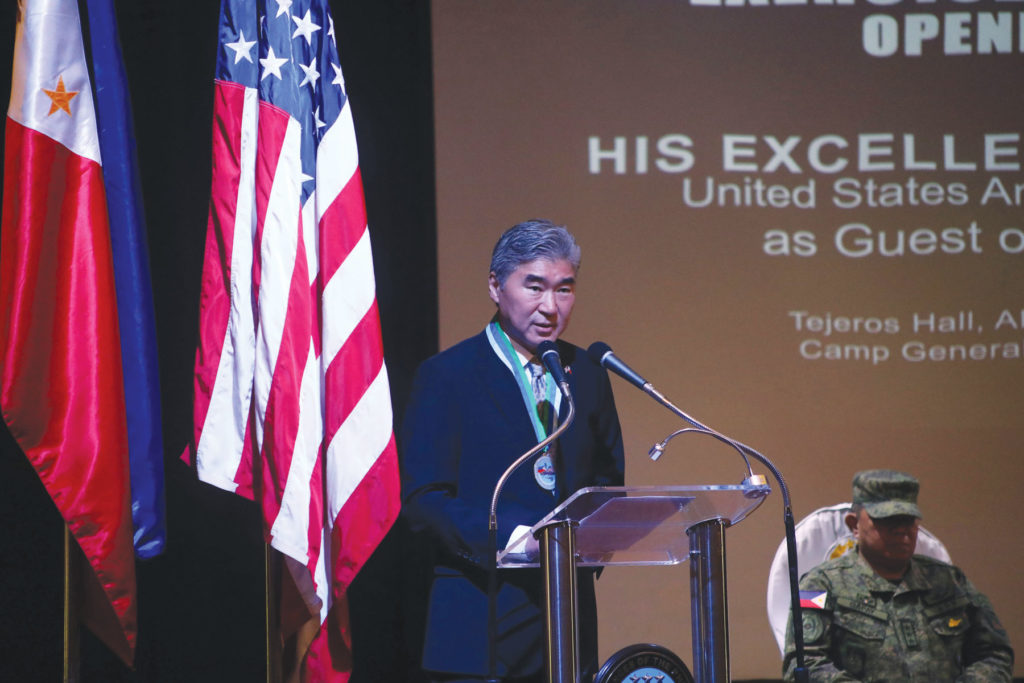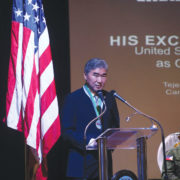
THE large-scale annual joint military exercises between Filipino and American troops officially started on Monday, April 1, participated in by 7,500 soldiers.
The 12-day military exercise, dubbed “Balikatan” (shoulder-to-shoulder), includes naval drills off the coast of Luzon island facing the disputed South China Sea. It is held mostly in the northern part of the Philippines — in parts of the provinces of Pampanga, Tarlac, and Zambales.
Several troops from Australia, as well as some observers from seven other countries, will be joining the drills this year.
“This year, Balikatan activities will focus in addressing traditional as well as non-traditional security concerns,” said Lt. Gen. Gilbert Gapay, Philippine exercise director.
According to him, other activities will include planning and simulation training, operational training and civic activities.
U.S. Exercise Director Brig. Gen. Chris McPhillips also said that F-35B stealth aircraft, F-18 fighter aircraft, and V-22 vertical takeoff aircraft will be involved in the drills.
Exercises not directed at any country
The Armed Forces of the Philippines (AFP) maintained that the Balikatan exercises are not directed at any country.
“It’s not directed to any threat or existing security concern. This is a generic exercise aimed at enhancing interoperability between Philippines and U.S. forces,” Gapay said.
McPhillips, for his part, said no adjustments will be made for the South China Sea, part of which is the West Philippine Sea.
“While each year we change Balikatan a little bit, like the general said, to introduce new capabilities and training, Balikatan is not aimed at any other nation in the region,” he said.
Mutual commitment
According to U.S. Ambassador Sung Kim, this year’s Balikatan is a “testament to our mutual commitment to the U.S.-Philippine alliance.”
“It links us together on a personal level, fortifying friendships and better camaraderie from the lowest levels up to the leadership ranks,” Kim said at Camp Aguinaldo.
“The relationships, skills, and cooperation that our nations build here will have significant implications for the safety and security of the Philippines and the whole Indo-Pacific region, and Australia’s participation makes this even more meaningful,” he added.
The 35th Balikatan will strengthen the armed forces of both countries, improve interoperability and facilitate a robust exchange of ideas and best practices, Kim further explained.
“Our militaries will spend the next two weeks working shoulder to shoulder, honing their skills in key areas such as counterterrorism, humanitarian assistance, and disaster relief,” he said.
AFP chief Gen. Benjamin Madrigal Jr., for his part, said that the exercise “is a testament of our enduring commitment to our defense partnership.”
“Every year when our troops train together and hurdle developed scenarios, in a way we actually relive the times when Filipinos and American soldiers fought side by side in defense of peace, freedom, and democracy,” he said.
Madrigal also noted that the timing of this year’s exercise coincides with the Day of Valor, the annual observance of Philippine Veterans Week and Bataan Day on April 9.
“Today, we continue this legacy through the Balikatan exercises where we continue to forge our bond as armed forces, where we develop our trust and confidence with each other and where we relentlessly strive and learn from one another, to be at our prime as protectors and defenders of our countries,” he said.






